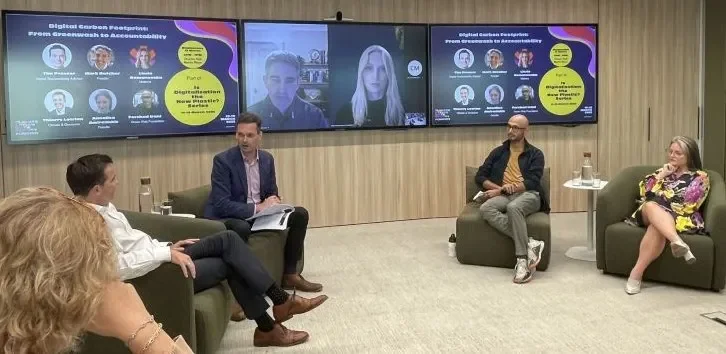From Talk to Action: Digital Carbon Footprint - From Greenwash to Accountability
Climate Action Week Sydney 2025 (#CAWSYD25) has concluded for another year, and one of its standout sessions, “Digital Carbon Footprint: From Greenwash to Accountability,” left attendees with much to consider regarding the environmental impact of our increasingly digital world. Held on Wednesday, 12th March at Charter Hall, Sydney, the event brought together a diverse audience of IT professionals, business leaders, sustainability experts and data managers eager to move beyond greenwashing and explore tangible strategies for reducing digital emissions.
The urgency of the discussion was palpable, echoing the introductory remarks highlighting the significant 40% contribution of individual technology use to a person’s carbon budget and the startling statistic of 90% of stored data being rarely accessed only 3 months after being created.
Against the backdrop of increasing regulatory scrutiny, with the Australian Regulators such as the ACCC’s past interventions against greenwashing and the impending mandatory climate emissions disclosure in Australia, the timing of this panel discussion was particularly pertinent.
The panel, expertly moderated by Tim Prosser, featured a wealth of knowledge and experience. Linda Romanovska from Materra Consulting brought her extensive background in sustainable finance and global corporate sustainability reporting, providing valuable insights into aligning digital investments with climate goals and navigating complex disclosure requirements. Annalisa Amiradakis of Deloitte, a leader in ESG Audit & Assurance, made clear the crucial role of assurance in validating technology-related ESG data and preparing for broader scope 3 reporting to include digital carbon footprints.
From the perspective of practical implementation, Mark Butcher of Posetiv, a GreenOps advocate, offered concrete strategies for transforming IT services towards sustainability and cost-effectiveness, demonstrating the application of FinOps principles in reducing digital carbon emissions. Thierry Lotrian from Climate & Decisions shed light on leveraging data and AI to integrate climate and ESG principles into decision-making processes concerning digital technology, emphasising the use of performance and risk management capabilities. Finally, Fershad Irani from the Green Web Foundation provided valuable practical guidance on utilising tools like the Co2.js library to estimate and reduce emissions from apps and websites, and how the Green Web Dataset can aid in verifying the sustainability of hosting providers, moving us closer to a fossil-free internet.
The structured conversation addressed critical questions around measuring and disclosing technology emissions, identifying high-impact areas for reduction within a company’s IT estate, and exploring innovative solutions to mitigate the demands on energy and water resources in Australia’s high digital consumption environment. The discussion tackled the crucial distinction between genuine accountability and greenwashing, outlining key indicators of misleading sustainability claims. The issue of e-waste was also addressed, with panellists offering strategies for recovery and reuse. Furthermore, the implications of the Australian government’s soon to be introduced Environmentally Sustainable Procurement requirements for ICT contracts above $1m was also raised.
A key takeaway was the emphasis on data as the foundation of accountability, as highlighted in the panel preface. The discussion explored the key data points necessary to track and analyse to build trust and integrity in digital sustainability efforts.
The final part of the session, “Future Action & What Can We Do Next?”, was a particularly crucial, culminating in a call to action asking individuals and organisations for one key commitment to move from greenwash to accountability. The audience Q&A session provided an opportunity for attendees to directly engage with the panellists, further enriching the discussion and uncovered nuanced challenges and solutions.
Overall, the “Digital Carbon Footprint: From Greenwash to Accountability” event at CAWSYD 2025 represented a significant step forward in fostering a more informed and actionable approach to digital sustainability. By bringing together diverse expertise and a motivated audience, the session contributed to a greater understanding of the challenges and opportunities in reducing the environmental impact of our digital lives, moving us from mere slogans towards data-driven accountability. The references provided, including the “CLOUDED II” film and the Green Web Foundation resources, serve as valuable follow-up materials for attendees eager to delve deeper and implement sustainable practices within their own spheres of influence.
